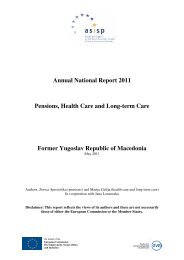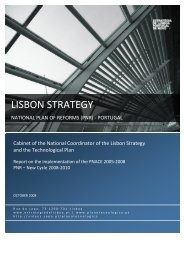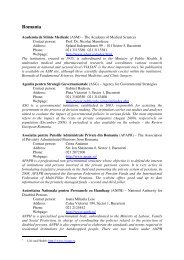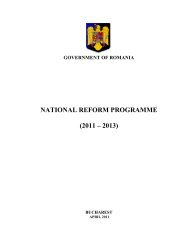National reform programme 2008-2010 Malta - European Commission
National reform programme 2008-2010 Malta - European Commission
National reform programme 2008-2010 Malta - European Commission
You also want an ePaper? Increase the reach of your titles
YUMPU automatically turns print PDFs into web optimized ePapers that Google loves.
Reform in the Vehicle Registration Tax Regime<br />
<strong>Malta</strong> is amongst the top five EU Member States with the highest proportion of private car<br />
ownership – two cars for every household. The average vehicle age of private road vehicles<br />
is relatively high with over half registered vehicles between five and twelve years old. The<br />
continuing growth in private car ownership and use is causing increased traffic congestion,<br />
whilst older vehicles impact more negatively on the environment.<br />
Declining patronage figures show that the use of Public Transport by private citiziens is not<br />
very widespread. Over the ten year period 1995 – 2005, annual patronage has decreased<br />
from 36 to 29 million commuters 50 . One of the principal reasons underlying the consumer’s<br />
preference to use private transport instead of the public bus service is because the current<br />
public transport routes have been established with Valetta as the central hub for all<br />
connections to the various towns and villages. Today it is acknowledged that an improved<br />
system is required in order to increase the use of Public Transport by the Maltese<br />
community. The scheduled public bus service is one of the pillars of the Transport Reform<br />
initiative which principally seeks to achieve a favourable modal shift towards public transport,<br />
thereby mitigating the negative environmental impact.<br />
It is the intention of the Maltese Government to amend the motor vehicle registration tax and<br />
Annual Road Circulation tax to one based on the Polluter Pays Principle. In effect this<br />
change in tax will be based on a CO 2 and size based Registration Tax. Moreover, the Annual<br />
Circulation Tax will be based on the emissions and age of the vehicle in question. This<br />
should induce new vehicle owners to purchase smaller and less polluting vehicles since the<br />
cost of maintaining a vehicle that emits less and which is smaller in size will be more<br />
advantageous.<br />
Water Conservation<br />
The conservation of water is a very important element especially in <strong>Malta</strong> where there is a<br />
shortage of water supplies which are usually mitigated through reverse osmosis systems.<br />
Utilising reverse osmosis systems to meet the local water demand implies that <strong>Malta</strong> is also<br />
utilising its energy resources for the production of water resources. This is having a direct<br />
impact on the levels of energy consumption in <strong>Malta</strong>. In addressing this issue, Government<br />
needs to adopt a strategy whereby conservation of water is promoted.<br />
Densely populated areas where urbanisation has taken place along watercourses have in the<br />
past few decades become increasingly prone to flash flooding. Presently all water runoff from<br />
these areas culminates and passes through the lower areas, such as Msida, Gzira,<br />
Marsascala, Marsa and Qormi, and poses greatest risks to life and property, before going to<br />
the sea. The situation is untenable and with climate change the vulnerability of these areas is<br />
likely to increase.<br />
50 Figures obtained from the Ministry of Investment, Transport and Communications.<br />
<strong>Malta</strong> <strong>National</strong> Reform Programme <strong>2008</strong>-<strong>2010</strong> - 67 -







